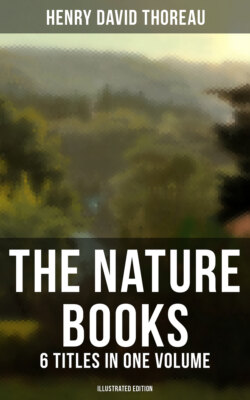Читать книгу The Nature Books of Henry David Thoreau – 6 Titles in One Volume (Illustrated Edition) - Henry David Thoreau - Страница 15
На сайте Литреса книга снята с продажи.
ANACREON.
Оглавление"Nor has he ceased his charming song, for still that lyre,
Though he is dead, sleeps not in Hades."
Simonides' Epigram on Anacreon.
I lately met with an old volume from a London bookshop, containing the Greek Minor Poets, and it was a pleasure to read once more only the words, Orpheus, Linus, Musaeus,—those faint poetic sounds and echoes of a name, dying away on the ears of us modern men; and those hardly more substantial sounds, Mimnermus, Ibycus, Alcaeus, Stesichorus, Menander. They lived not in vain. We can converse with these bodiless fames without reserve or personality.
I know of no studies so composing as those of the classical scholar. When we have sat down to them, life seems as still and serene as if it were very far off, and I believe it is not habitually seen from any common platform so truly and unexaggerated as in the light of literature. In serene hours we contemplate the tour of the Greek and Latin authors with more pleasure than the traveller does the fairest scenery of Greece or Italy. Where shall we find a more refined society? That highway down from Homer and Hesiod to Horace and Juvenal is more attractive than the Appian. Reading the classics, or conversing with those old Greeks and Latins in their surviving works, is like walking amid the stars and constellations, a high and by way serene to travel. Indeed, the true scholar will be not a little of an astronomer in his habits. Distracting cares will not be allowed to obstruct the field of his vision, for the higher regions of literature, like astronomy, are above storm and darkness.
But passing by these rumors of bards, let us pause for a moment at the Teian poet.
There is something strangely modern about him. He is very easily turned into English. Is it that our lyric poets have resounded but that lyre, which would sound only light subjects, and which Simonides tells us does not sleep in Hades? His odes are like gems of pure ivory. They possess an ethereal and evanescent beauty like summer evenings,—which you must perceive with the flower of the mind,—and show how slight a beauty could be expressed. You have to consider them, as the stars of lesser magnitude, with the side of the eye, and look aside from them to behold them. They charm us by their serenity and freedom from exaggeration and passion, and by a certain flower-like beauty, which does not propose itself, but must be approached and studied like a natural object. But perhaps their chief merit consists in the lightness and yet security of their tread;
"The young and tender stalk
Ne'er bends when they do walk."
True, our nerves are never strung by them; it is too constantly the sound of the lyre, and never the note of the trumpet; but they are not gross, as has been presumed, but always elevated above the sensual.
These are some of the best that have come down to us.
